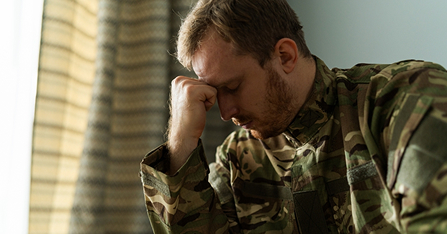Generalized Anxiety Disorder impacts many veterans, making it difficult for them to work, socialize, and function typically after leaving the military.
Summary
- Veterans who can trace their Generalized Anxiety Disorder back to their military service may be eligible for compensation.
- Generalized Anxiety Disorder is characterized by both mental and physical symptoms, including disproportionate worry or apprehension and fatigue.
- Traumatic experiences or living with constant stress are common sources of Generalized Anxiety Disorder in veterans.
Understanding VA Disability Ratings for Generalized Anxiety Disorder (GAD)
Thousands of veterans across the United States suffer from generalized anxiety disorder (GAD) as a result of their service in the military. This condition can manifest in different ways, impacting a person’s ability to live, work, and maintain relationships.
To help offset the effects of GAD on veterans’ lives, generalized anxiety disorder VA disability benefits were established to provide financial support to individuals who experience this difficult mental health condition.
Successfully applying for and securing these benefits is challenging, and many veterans are initially denied benefits for a variety of reasons. The team of experienced attorneys at VetLaw understands the VA process and knows how to effectively navigate even the most complex cases.
We have helped numerous veterans craft a strong case, increase their generalized anxiety disorder VA rating, and appeal their denied claims.
To learn more about how we can help, consider connecting with us today by calling us at (855) 500-4672 or filling out a contact form. We will use our expertise to assess your VA disability claim and then recommend the appeals path we believe gives you the best chance of securing benefits.

Contact Us Today
We Will Fight For Your Benefits
We guarantee 100% privacy. Your information will not be shared.
What Are the Signs and Symptoms of Generalized Anxiety Disorder?
Generalized anxiety disorder is a condition that causes excessive and ongoing worry. People with generalized anxiety disorder may feel constantly overwhelmed by everyday issues.
This anxiety can be extremely difficult to control, and it can interfere greatly with day-to-day activities. Generalized anxiety disorder can manifest both psychologically and physically.
Some of the most common psychological symptoms of generalized anxiety disorder include:
- Restlessness
- Sense of dread
- Constantly feeling on edge or fearful
- Difficulty concentrating on tasks
- Irritability
On the other hand, some of the physical signs of this condition include:
- Tiredness
- Difficulty sleeping
- Muscle tension
- Heart palpitations
- Excessive sweating
- Nausea or diarrhea
- Shortness of breath
- Shaking or trembling
While the signs and symptoms of generalized anxiety disorder vary from person to person, many individuals withdraw socially or are unable to work as a result of their condition. Unfortunately, as generalized anxiety disorder is often connected to traumatic experiences and high levels of stress, this condition is prevalent among veterans.
How Can Military Experience Cause Generalized Anxiety Disorder?
Veterans are at a greater risk for developing generalized anxiety disorder, with a recent study of veterans finding that almost 8% had symptoms of GAD while only 3% of civilians do. Both combat and non-combat veterans are exposed to traumatic events during military service, making anxiety a very common issue among the veteran population.
Natural disasters, vehicle accidents, combat, and sexual assault are all common triggers for service-related generalized anxiety disorder. While not all incidents can result in anxiety disorder, the chances of developing GAD increase depending on the severity of the trauma, the emotional reaction of those involved, and whether the veteran was injured as a result.
Moreover, repeated exposure to traumatic incidents can greatly increase a person’s likelihood of developing generalized anxiety disorder. It is important to note that experiencing anxiety is understandable after a traumatic event.
Mental health is a very real concern for veterans. We are passionate about advocating for the rights of individuals who struggle with service-related generalized anxiety disorder and other conditions.

Does the VA Consider Generalized Anxiety Disorder to Be a Disability?
Yes, the VA does consider generalized anxiety disorder to be a disability. To qualify for generalized anxiety disorder VA disability benefits, you must prove that your condition was either caused by or worsened by your military service.
Obtaining a GAD diagnosis or reporting anxiety symptoms during your military service can help establish this connection. Even if your symptoms began after your service, however, it is still possible to build a case.
Perhaps you were misdiagnosed during your military service, or your generalized anxiety disorder was not diagnosed until after you were discharged. Regardless, as long as you can prove that your GAD was caused by a specific stressor during your service, you may be able to collect disability benefits for your condition.
What Is the VA Disability Rating for Generalized Anxiety Disorder (CAD)?
Broadly, mental health conditions are categorized under 38 CFR § 4.130 in the Schedule for Rating Disabilities. Anxiety disorders can be rated between 0% and 100%, increasing in 10% increments. According to Diagnostic Code 9400, your generalized anxiety disorder VA rating will be determined based on the following criteria.
VA Diagnostic Criteria for Generalized Anxiety Disorder:
- 0% if you have been diagnosed with an anxiety condition but your symptoms are not severe enough to interfere with normal functioning.
- 10% if you experience mild or transient symptoms that lower work efficiency and your ability to perform tasks during periods of high stress.
- 30% if you suffer from moderate occupational and social impairment and intermittently reduced efficiency at work due to symptoms such as depression, anxiety, sleep impairment, memory loss, etc.
- 50% if your condition causes moderate to severe occupational and social impairment and lowered reliability and productivity due to symptoms such as panic attacks, impaired thinking and judgment, mood disturbances, and/or difficulty maintaining relationships.
- 70% if you experience severe occupational and social impairment that impacts work, school, family relations, etc. due to suicidal ideation, poor impulse control, neglect of personal hygiene, inability to adapt in stressful situations, and/or inability to establish relationships.
- 100% if you are totally unable to function in occupational or social settings due to symptoms like hallucinations, inappropriate behavior, disorientation, memory loss, or if you are a danger to yourself and others.
When assigning a generalized anxiety disorder VA rating, all of your documented symptoms will be taken into account. Additionally, the VA will account for the way they impact your occupational and social functioning.
The VA will use a variety of information to make this determination. This can include medical records, your C&P exam, and supporting statements.
The VA requires a great deal of documentation to establish the connection between your condition and your military service. Many veterans are initially denied disability benefits due to mere oversights or insufficient evidence during the process.

What If the VA Denies Your CAD Claim?
If the VA denies your claim for generalized anxiety disorder, there are several options available to appeal the decision and continue your case. One such option is to file a Supplemental Claim to include additional evidence that may be helpful for your case.
Alternatively, you may request a Higher-Level Review for a senior reviewer to reassess your case. If you believe an error occurred during the decision-making process, or if you filed incorrect documentation, for example, this appeal option may be particularly beneficial.
Finally, if neither of these options is right for your case, your attorney may recommend taking your claim to the Board of Veterans’ Appeals. From there, any of the following actions can be taken:
- Submitting additional evidence
- Requesting a direct review from a Veterans’ Law Judge
- Scheduling a hearing with a judge to discuss matters related to your case
Your attorney will review your case to identify the right solution to overturn your denied claim. They can also help you successfully secure generalized anxiety disorder VA disability benefits.
Hiring an Attorney Near You to Help with Your VA Disability Appeal
Hiring an attorney to help you with your VA disability appeal can make all the difference in the outcome of your case. The right attorney will act as your skilled advocate and legal strategist. They can work alongside you to understand your needs and craft a solution to meet your goals.
As the law firm of choice for veterans across the U.S., VetLaw was established to defend the rights of veterans. We work tirelessly to ensure that these hardworking men and women are able to receive the generalized anxiety disorder VA disability benefits they deserve.
To learn more about how our team can help, consider scheduling your free case review today.
Frequently Asked Questions
Veterans may notice that Generalized Anxiety Disorder and PTSD have several symptoms in common. For example, feeling on edge or struggling with insomnia are characteristic of GAD and PTSD. It can be difficult to distinguish which disorder a symptom is indicating, particularly if you are diagnosed with both conditions.
However, there are a few notable differences. Generalized Anxiety Disorder is a chronic condition characterized by persistent unease in most situations. Post-Traumatic Stress Disorder is an acute condition, meaning a specific event led to the onset of the disorder.
PTSD symptoms are prompted by certain triggers, rather than present consistently regardless of the circumstances. Additionally, veterans with PTSD are prone to dissociative episodes like flashbacks.
Gastrointestinal conditions, like Crohn’s disease and IBS, can be closely connected to mental health conditions like anxiety. For example, a veteran suffering from Generalized Anxiety Disorder may experience an IBS flare-up when under stress. Some research also suggests gastrointestinal conditions can influence mental health.
Let’s say you were exposed to toxic burn pits and developed Crohn’s disease as a result. The inflammation of your digestive tract upsets the bacteria levels in your gut. In turn, that disrupts the production of neurotransmitters.
Low levels of neurotransmitters like serotonin and GABA can interfere with a normal anxiety response. This may manifest as Generalized Anxiety Disorder. In this example, you may have a case that your GAD is connected to your service-related Crohn’s disease.
The VA may offer you disability benefits for Generalized Anxiety Disorder as a Secondary Condition.
For claims based on pre-existing conditions, the VA will want evidence that your military service actively made your Generalized Anxiety Disorder worse. First, you’ll need documentation that your Generalized Anxiety Disorder predates your military service.
You can submit your medical entrance exam or medical records from your provider as evidence. Additionally, you and your VA disability appeals lawyers will need to show how the conditions of your military service caused your GAD symptoms to be more severe or more frequent.
Without a medical nexus to substantiate a service connection, the VA can deny your claim. Your VA disability attorney may advise you to file additional supporting documents.
For example, this could include buddy letters from military personnel who witnessed the progression of your Generalized Anxiety Disorder symptoms.
Researchers have uncovered a potential relationship between anxiety disorders, like GAD, and debilitating migraines. Several studies have documented the high correlation between anxiety and migraines in individuals. Veterans may be able to obtain VA disability benefits for migraines secondary to service-related Generalized Anxiety Disorder.

